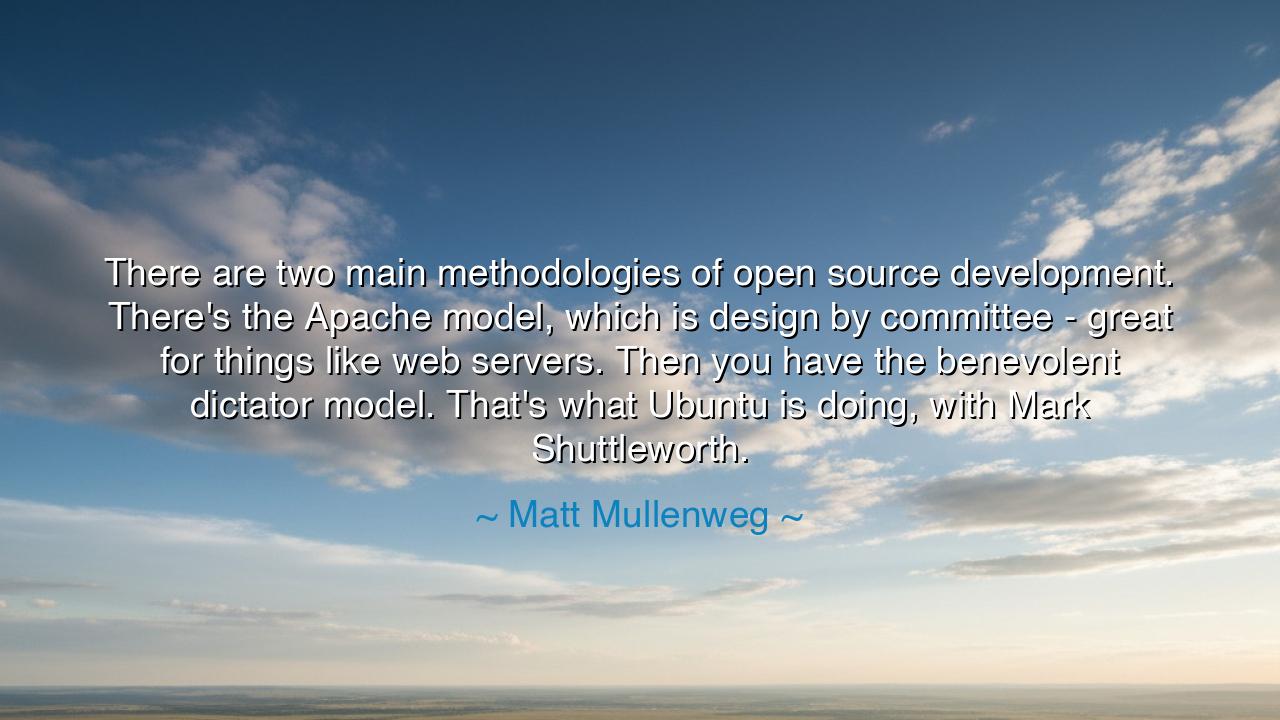
There are two main methodologies of open source development.
There are two main methodologies of open source development. There's the Apache model, which is design by committee - great for things like web servers. Then you have the benevolent dictator model. That's what Ubuntu is doing, with Mark Shuttleworth.






The open-source pioneer Matt Mullenweg, creator of WordPress, once observed: “There are two main methodologies of open source development. There's the Apache model, which is design by committee—great for things like web servers. Then you have the benevolent dictator model. That's what Ubuntu is doing, with Mark Shuttleworth.” These words, though spoken about software, echo far beyond the realm of code. They speak to the governance of creation, to the eternal struggle between collective wisdom and singular vision—the two forces that shape not only technology, but civilization itself.
The Apache model, as Mullenweg explains, is design by committee—a gathering of minds who collaborate through debate and consensus. It mirrors the democracy of Athens, where citizens once gathered in the agora to shape the destiny of their polis. This method is slow, deliberate, and often cumbersome, yet from it can arise extraordinary stability. Like a cathedral built by many hands, it endures through the shared investment of its builders. Mullenweg honors this model, seeing in it the disciplined power of community—an architecture of agreement that works best when the task demands endurance and consensus rather than speed.
But the other path, the one Mullenweg names with both respect and caution, is the benevolent dictator model—a phrase that stirs both reverence and unease. In this method, the project follows the vision of a single guiding figure: one who sees clearly, decides swiftly, and carries the weight of stewardship for all. The Ubuntu project, under Mark Shuttleworth, embodies this path. Like a philosopher-king from the dialogues of Plato, the benevolent dictator leads not for personal power, but for coherence, ensuring that the creation retains its soul amid the noise of many voices. It is a system that relies not on structure, but on trust—the belief that the leader’s wisdom will serve the whole.
History is rich with parallels to these twin philosophies. Consider the Roman Republic, governed by senate and counsel, where debate forged law and policy—a living embodiment of the Apache model. Yet in times of crisis, the Romans appointed a dictator, a single leader to act decisively when the state’s survival demanded unity of will. The wisest of them, like Cincinnatus, wielded power not for glory but for duty, returning to his plow when the work was done. So too in the world of open source, the benevolent dictator must rule with humility, for their strength lies not in command, but in vision tempered by restraint.
Mullenweg’s reflection also warns of balance. The committee without direction becomes tangled in indecision, its harmony collapsing into stagnation. Yet the dictator without humility becomes tyranny, smothering the creative spirit that gave the project life. Thus, the challenge of leadership—whether in code or in kingdoms—is not to choose one path absolutely, but to weave the two together. The best projects, like the best societies, blend freedom with guidance, discussion with decision, and collaboration with conviction.
We see this lesson repeated in the lives of creators. The great artist Michelangelo was no committee; his vision carved stone into eternity. Yet he drew strength from the techniques and teachings of others, from the generations of artisans who laid the foundation of his craft. Conversely, the builders of Gothic cathedrals worked in anonymity, their hands united by faith, their purpose shared. Both paths birthed beauty. Both, when guided by service to something greater than the self, achieved greatness.
The lesson is clear: whether one leads or follows, creation demands balance. If you are part of a team, honor the strength of unity; if you are a leader, wield your authority with compassion. Seek wisdom in many voices, but preserve clarity of vision. For as Mullenweg teaches, the act of creation—whether of software, art, or society—thrives only when power serves purpose. The committee and the dictator, the chorus and the conductor, must both remember that they are not the music itself, but its caretakers.
And so, let this wisdom endure: lead with vision, collaborate with humility, and serve the work above the ego. Whether you code or compose, govern or guide, let your structure—be it democratic or directed—exist for the sake of creation, not control. For in the harmony between collective effort and singular purpose lies the secret of all lasting works, from the open code of humanity to the open hearts that sustain it.






AAdministratorAdministrator
Welcome, honored guests. Please leave a comment, we will respond soon